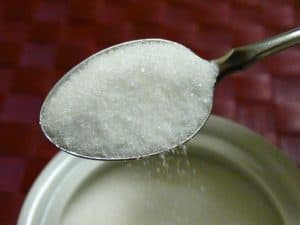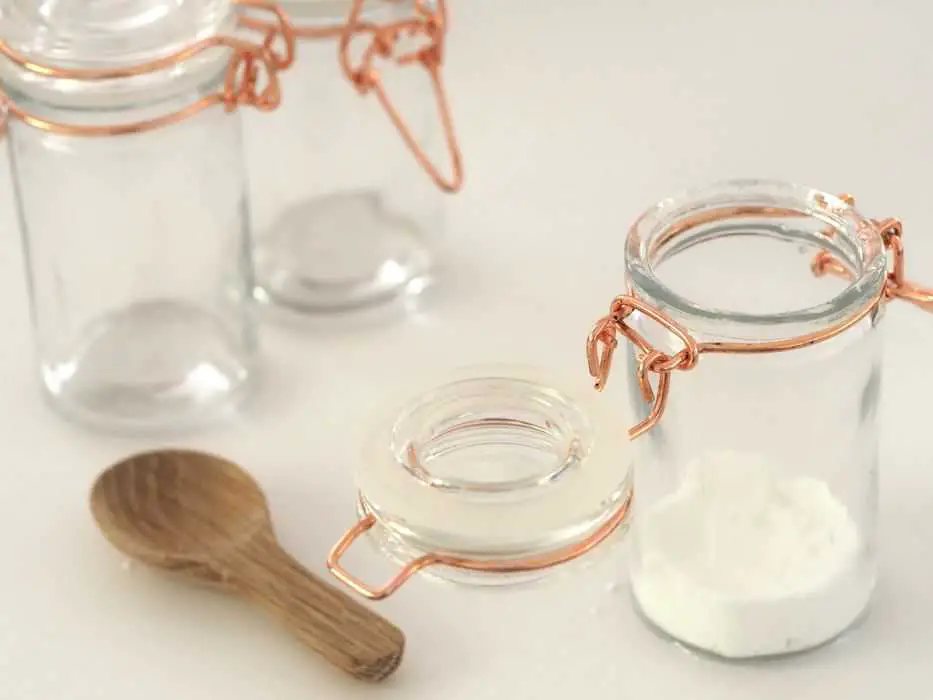When it comes to the keto diet, you’ll want to avoid sugar at all costs.
Sugar is a carbohydrate, and it’s in a lot of foods – more than you might think.
One of the first big frustrations that a lot of people come to on the keto diet is how to eat sweets and curb those sweet cravings while avoiding sugar. And that’s where sugar alternatives come into play.
There’s a lot of sweeteners and sugar alternatives on the market, so comparing all of the pros and cons between them all can get a little confusing.
In this article, I want to focus on one that’s used in a LOT of pre-packaged foods, and that is also sold as a sugar replacement – it’s called xylitol.
What Is Xylitol?
Xylitol is characterized as a fairly common sugar substitute, used mostly in pre-packaged goods, and rarely sold for consumer use.
It is technically the sugar-alcohol version of xylose, which is a naturally occurring sugar molecule. Other common types of sugar alcohols include erythritol, maltitol, and sucralose. Xylitol is naturally found in a lot of whole foods including fruits, vegetables and and berries, and it can also be found in a lot of products including:
- Chewing gum
- Toothpastes
- Yogurts
- Mouthwash
- Peanut butter
- Sugar-free candy
- Fruit drinks
- Jellies and jams
- Sugar free mints
Xylitol unfortunately isn’t a zero calorie sugar alternative such as monk fruit or stevia, but still does contain less sugar and carbohydrates than regular sugar.
With 100 grams of xylitol, you’ll usually see about 250 calories, 100 grams of carbohydrates, and 0 grams of protein and fat. Compared to table sugar, which per 100 grams yields 100 grams of carbohydrates, but over 387 calories.
A big thing that sets it apart from other sweeteners like dextrose or maltodextrin, is that xylitol doesn’t contain any fructose, so it contributes to a significantly lower spike in blood glucose levels compared to normal sugar. Xylitol’s glycemic index value is at around 7, whereas sugar’s tends to lie between 60 and 70.
Xylitol’s sweetness is fairly comparable to that of sugar’s as well, which is why it’s frequently used as a substitute for sugar in a lot of recipes to help restrict calories and not effect one’s blood sugar as intensely.
Benefits of Xylitol
-
It can help to prevent obesity
As many know, the general consensus from years of peer-reviewed research shows that consuming excessive amounts of refined sugar and carbohydrates directly contribute to weight gain, metabolic syndrome, and obesity.
When xylitol is used as a direct sugar substitute, it helps to restrict calories, lowers blood sugar spikes, and helps to aid in digestion and feeling full longer. Because of this, xylitol in a sense can contribute to obesity prevention, when used sparingly, and in the right ways.
-
It can reduce LDL cholesterol
One study found that xylitol also helped to reduce LDL cholesterol (the bad kind of cholesterol) in mice.
Mice who were fed xylitol consistently saw much higher levels of HDL cholesterol (the good kind of cholesterol) than mice who weren’t given xylitol, and by a natural product of that increased HDL cholesterol, they also saw reduced LDL cholesterol.
HDL cholesterol functions by clearing out your arteries of LDL cholesterol, which has been linked to increased risk of obesity, diabetes, stroke, and heart disease.
-
It may be able to help with diabetes
In one recent animal study, xylitol was determined to be a more effective sugar substitute than sucralose when it comes to managing symptoms of diabetes.
The study discovered that after roughly three weeks of being fed either sucralose or xylitol, food intake was had significantly lowered within the group that was fed xylitol. Thirst and fasting blood sugar levels also declined within this group, which are clear signs of the reversal of prediabetes and benefits for those with Type 2 diabetes.
-
It helps to prevent dental cavities
Xylitol is much more safe for your dental health than that of sugar, so replacing it can help to reduce your number of cavities and overall dental issues.
It also has a natural propensity to boost and promote oral health, which is why you’ll often see xylitol in a variety of chewing gums, toothpastes, and mouthwashes.
Research suggests that xylitol is actually able to reduce the amount of mutans streptococci in our plaque and saliva by inhibiting their energy production methods, resulting in a decrease in severity of gingivitis, cavities, and tooth decay.
-
It can enhance collagen production
Recent studies have also shown that xylitol is actually able to help enhance collagen synthesis.
Collagen synthesis is the process in which your body produces collagen, which is a protein from your connective tissue that helps to promote the elasticity of your skin, reducing wrinkles and keeping your face looking younger.
According to another animal study, rats who were fed xylitol exhibited an increase in their synthesized collagen, which resulted in stronger skin growth.
-
It might be able to accelerate ketosis
A great benefit for us keto dieters, is that xylitol has the potential to accelerate the state of ketosis.
In a study made up of 72 surgical patients who were undergoing gastric resectioning or gallbladder removal, it was revealed that xylitol led to an increase ketone levels within their blood, and led to ketosis, even when combined with carbohydrates, oddly enough.
While this may have been the case, it’s still not advised to consume a lot of xylitol in a given day, because it is a carbohydrate, and could still take you out of ketosis.
Side Effects of Xylitol

While there are a lot of great benefits of xylitol, it still has some hefty side effects and downsides that need to be considered when deciding on using it versus other available sugar alternatives. The biggest and most common side effects include:
-
It may slow down weight loss process
One 2017 study discovered that obese individuals who were participating in a year-long weight loss program were less likely to lose weight if they had higher levels of xylitol in their systems from the start.
It’s important to remember that this doesn’t automatically show a causal relationship, but it is important to consider when deciding on a sweetener substitute.
If you’ve been having trouble losing weight, cutting out xylitol is still a good place to start, because at the end of the day it is still a carbohydrate.
-
It can make gastrointestinal problems worse
All types of sugar alcohols are known to pull water into your intestine, which can result in bloating, nausea, and general discomfort. However, xylitol appears to be one of few sugar alcohols that the body has an easy time adjusting to.
That’s why it’s important to ease into using xylitol, and to try to avoid overusing it in order to avoid these unwanted symptoms. If you struggle with irritable bowel syndrome (IBS), you may want to stay away from sugar alcohols, including xylitol, altogether.
-
High carbohydrate count
As mentioned above, xylitol has a particularly high carbohydrate count, which can contribute to weight gain, and obviously take you out of ketosis if consumed in large enough quantities.
That’s why xylitol should more or less be treated like sugar when being used as a substitute, because even though it has a lower glycemic index value, it still has the potential to raise your net carb count higher than you may be anticipating.
-
It can cause diarrhea
Like other sugar alcohols, xylitol is unfortunately also a diarrhetic. While xylitol is a little bit safer than other sugar alcohols in this department, it’s still unpredictable varying from person to person, and should be used with caution, especially if you already know that other types of sugar alcohols can have a similar effect on you personally.
-
It’s toxic to dogs
While this isn’t diet related, it is important to know that xylitol is very toxic from dogs, so you should always keep it out of their reach when cooking with it, or eating any pre-packaged foods that might contain it. Even small doses of xylitol can be fatal for dogs if not properly treated.
Is Xylitol Keto-Friendly?
While xylitol does have a lower glycemic index value, and fewer calories than sugar, it’s status as a keto-friendly sweetener is a bit conflicting in my opinion.
It is technically fine on the keto diet in strict moderation, just as sugar is, but they essentially have the same exact carbohydrate counts, meaning as a substitute, it really isn’t substituting much from a ketogenic perspective.
Because of this, I’m more likely to recommend more keto-friendly sweeteners and sugar substitutes that have low carbs, low glycemic index values, and are still sweet enough to get the job done. I’ll get into some of my favorite ones next.
Alternatives to Xylitol
-
Monk Fruit
Monk fruit is one of my favorite low calorie, low carb alternatives sweeteners for the keto diet.
Specifically, monk fruit is zero carb and zero calorie, while still being 150-250 times sweeter than table sugar, so a little goes a long way with it.
Monk fruit tends to come in powder or extract form, but it also can be sold as a syrup, which is a great replacement for maple syrup in most breakfast recipes. Lakanto Monk Fruit Maple Syrup is my favorite version of it.
The only real drawback is that it can be a little more expensive than other sweeteners like xylitol, so it’s not the best sweetener for those on keto that are also following a tight budget.
-
Stevia
Stevia is a fairly common sweetener that is derived from a natural plant source and unlike xylitol, it contains zero calories and carbs!
Additionally, there are no recorded negative health effects of stevia, and it is also one of the few sugar alternatives that will not cause spikes in blood sugar levels.
What’s even better, is that stevia might actually be connected to a reduction in blood pressure levels and may even be able to help fight off and prevent diabetes.
Stevia tends to come in a liquid extract or powdered form, and is usually added to beverages and baked goods.
-
Erythritol
Erythritol is another type of sugar alcohol, but unlike xylitol, it only has about 0.24 calories per gram, while tasting nearly identical to sugar.
Most of the erythritol that is eaten is absorbed straight into the bloodstream and excreted without being actually being, so it doesn’t tend to spike blood sugar levels either.
Erythritol is pretty common for a lot of keto-friendly recipes, as it can come in the form of an extract or a powder (think powdered sugar), and mixes in with ingredients fairly easily. It also doesn’t really have an unpleasant aftertaste, which you’ll unfortunately find in a lot of alternative sweeteners.
-
Yacon Syrup
Yacon syrup is an alternative sweetener that is derived from the roots of the yacon plant. Fructans are the active ingredient in yacon syrup, which give it that sugary and sweet flavor.
Because a significant portion of yacon syrup isn’t actually digested when it is consumed, it has roughly a third of the caloric value of sugar, which is about 133 calories per 100 grams.
However because it is high in fructans, it also has a lot of carbs, roughly 12 net carbs for two tablespoons, so if you decide to use yacon syrup in place of sugar, you’ll need to be sure to use it sparingly on keto.
-
Sucralose
Sucralose, which is commonly known as Splenda, is easily available in bulk, or in small packets like sugar packets, and can be used to substitute sugar in most cases.
These bulk packets of sucralose however are not free of carbs, so they definitely need to be carefully measured when following the keto diet. Generally, bulk sucralose comes in at about 24 carbs per cup, whereas each packet of sucralose has about 1 carbohydrate.
While it’s very low in carbs, and is just as sweet as sugar in most cases, it still has the potential to spike your blood sugar, so sucralose should be used sparingly in favor of other sweeteners.
Final Thoughts
As we’ve seen, xylitol isn’t inherently not allowed on the keto diet, but it should be more or less treated the same as sugar when it comes to counting carbs.
It may be great for people who are trying to restrict their calories, but from a ketogenic view, it doesn’t really substitute enough to make it a keto-friendly sweetener.
Fortunately, as we saw above, there’s still a lot of great keto-friendly sweeteners on the market that you can try and add to your own dishes to help curb those troubling cravings.

